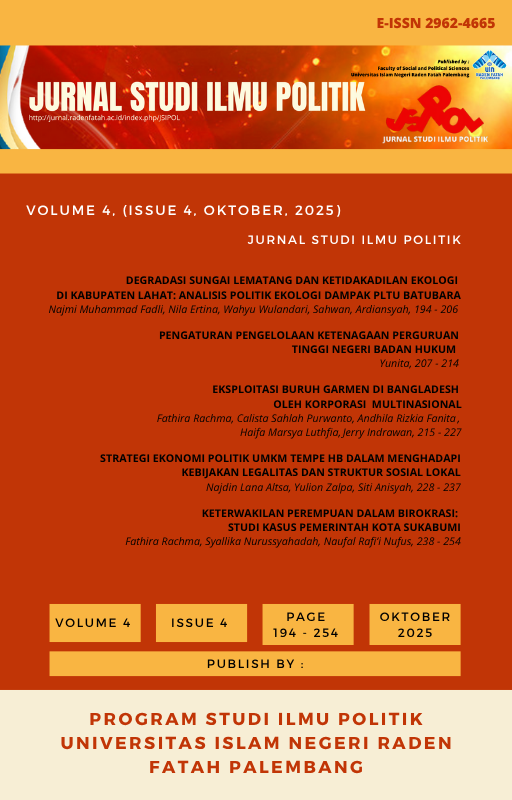Eksploitasi Buruh Garmen Di Bangladesh Oleh Korporasi Multinasional
Main Article Content
Abstract
The garment industry in Bangladesh plays a significant role in the global supply chain of fast fashion. However, behind its economic success lies the systemic exploitation of workers, particularly women. This study explores why such exploitation persists despite reforms and Corporate Social Responsibility (CSR) programs by multinational corporations. Using a qualitative descriptive method and critical theoretical perspectives, including Dependency Theory and theories of social justice, this study finds that the power dynamics between global corporations, local factory owners, and the Bangladeshi government are deeply imbalanced. CSR initiatives often serve as symbolic tools for reputation management, rather than offering real improvements to labor conditions. The findings emphasize that the continuation of labor exploitation is rooted in structural inequalities reinforced by global capitalism. This article recommends a model of governance based on mandatory Human Rights Due Diligence (HRDD), international regulatory frameworks such as the EU CSDDD, and the strengthening of workers’ rights through union freedom and transparent grievance mechanisms. These efforts are essential for ensuring ethical and equitable labor standards in the global garment industry.
Downloads
Article Details

This work is licensed under a Creative Commons Attribution-ShareAlike 4.0 International License.
Authors who publish with this journal agree to the following terms:
- Authors retain copyright and grant the journal right of first publication with the work simultaneously licensed under a Creative Commons Attribution License that allows others to share the work with an acknowledgement of the work's authorship and initial publication in this journal.
- Authors are able to enter into separate, additional contractual arrangements for the non-exclusive distribution of the journal's published version of the work (e.g., post it to an institutional repository or publish it in a book), with an acknowledgement of its initial publication in this journal.
- Authors are permitted and encouraged to post their work online (e.g., in institutional repositories or on their website) prior to and during the submission process, as it can lead to productive exchanges, as well as earlier and greater citation of published work
How to Cite
References
Apsari, R. D., Yuniati, S., & Indriastuti, S. (2022). Penerapan Konvensi ILO pada industri garmen Bangladesh (Studi kasus: Diskriminasi pekerja garmen perempuan). Electronical Journal of Social and Political Sciences, 9(3). https://jseahr.jurnal.unej.ac.id/index.php/E-SOS/article/download/32842/12196
Anti-Slavery International. (2024, July 25). EU Corporate Sustainability Due Diligence Directive: Analysis. https://www.antislavery.org
BBC Indonesia. (2019, August 10). Upah buruh rendah di Bangladesh dan industri fast fashion. https://www.bbc.com/indonesia/majalah-49279288
Business & Human Rights Resource Centre. (2024, June 19). Freedom of association is a human right: Why are garment workers still denied it? https://www.business-humanrights.org
Chaerani. (2018). Peran International Labor Organization terhadap peningkatan lingkungan kerja di sektor industri garmen di Bangladesh [Undergraduate thesis, Universitas Muhammadiyah Yogyakarta]. UMY Repository.
European Parliament. (2024). EU Corporate Sustainability Due Diligence Directive (CSDDD). https://www.europarl.europa.eu
Fontana, E., & Dawkins, C. (2024). Contesting corporate responsibility in the Bangladesh garment industry: The local factory owner perspective. Human Relations, 77(1), 24–48. https://doi.org/10.1177/00187267231218430
Frenkel, S. J., Rahman, S., & Rahman, K. M. (2022). After Rana Plaza: Governing exploitative workplace labour regimes in Bangladeshi garment export factories. Journal of Industrial Relations, 64(1), 31–56. https://doi.org/10.1177/00221856211072280
GoodWeave & The Rights Lab. (2025). Modern slavery and child labour in Bangladesh’s garment sector: Documenting risks and informing solutions. University of Nottingham. https://www.goodweave.org
Hossain, M. B., & Fazi, M. A. (2024). Foreign direct investment and the protection of garment workers’ rights in Bangladesh. International Journal of Law and Management, 66(2), 175–189. https://doi.org/10.1108/IJLMA-09-2023-0235
International Accord for Health and Safety in the Textile and Garment Industry. (2023, November 1). International Accord Framework for Country-Specific Safety Programs. https://internationalaccord.org
Kompas.id. (2023). Perbudakan di industri garmen global. https://www.kompas.id/artikel/perbudakan-di-industri-garmen-global
Kumparan. (2022, January 12). Gaji murah, kerja berat: Narasi buruh di balik ekspansi MNC ke negara selatan. https://kumparan.com
Liputan6. (2023, January 4). Studi: Zara hingga H&M eksploitasi pegawai Bangladesh. https://www.liputan6.com/global/read/5178632
Mikael, W., Mohammad, R., & Satwika, P. (2022). Dibalik model kerja fast fashion: Pengaruh Inditex terhadap eksploitasi buruh garmen di Bangladesh. Jurnal Ilmu Hubungan Internasional, 8(4), 899–910. https://ejournal3.undip.ac.id/index.php/jihi/article/view/34504
Prawiyogi, A. G., Sadiah, T. L., Purwanugraha, A., & Elisa, P. N. (2021). Penggunaan media Big Book untuk menumbuhkan minat baca siswa di sekolah dasar. Jurnal Basicedu, 5(1), 446–452. https://doi.org/10.31004/basicedu.v5i1.634
Rawls, J. (1971). A theory of justice (Original ed.). Harvard University Press.
Salsabila, A. (2021). The dark side of fast fashion: Eksploitasi buruh garmen di Bangladesh dalam pandangan neo-Marxisme. ResearchGate. https://www.researchgate.net/publication/353865988
Witarka, M., Rosyidin, M., & Paramasatya, S. (2022). Dibalik model kerja fast fashion: Pengaruh Inditex terhadap eksploitasi buruh garmen di Bangladesh. Jurnal Ilmu Hubungan Internasional, 8(4), 899–910. https://doi.org/10.14710/jihi.8.4.899-910

